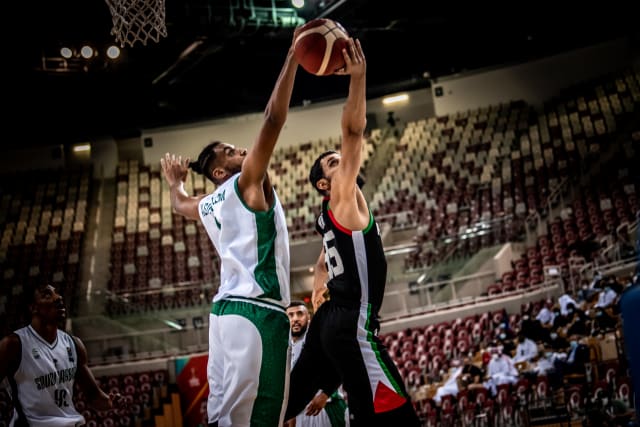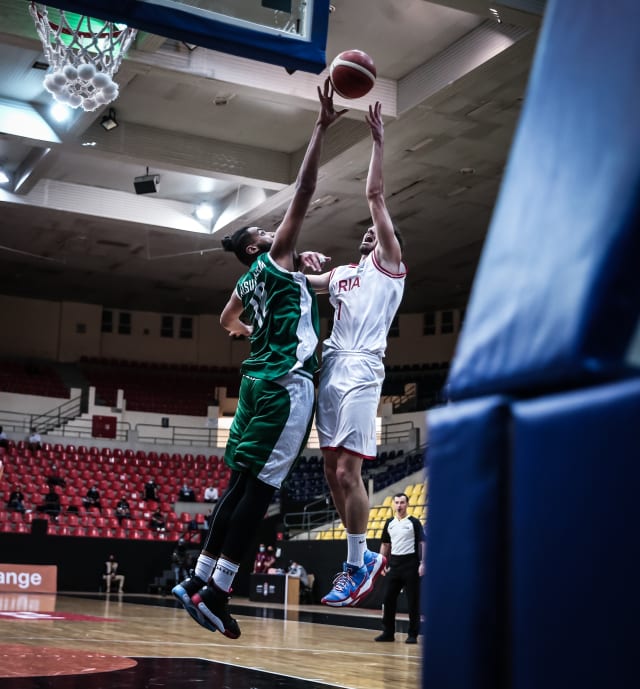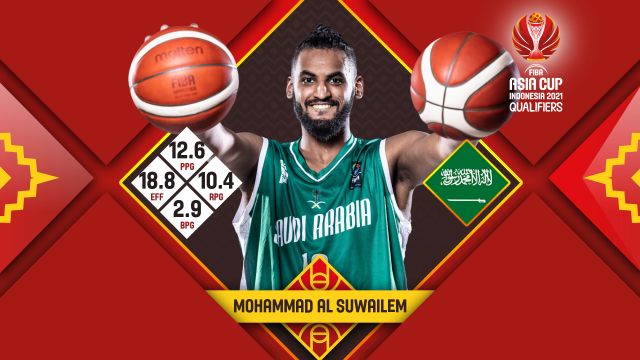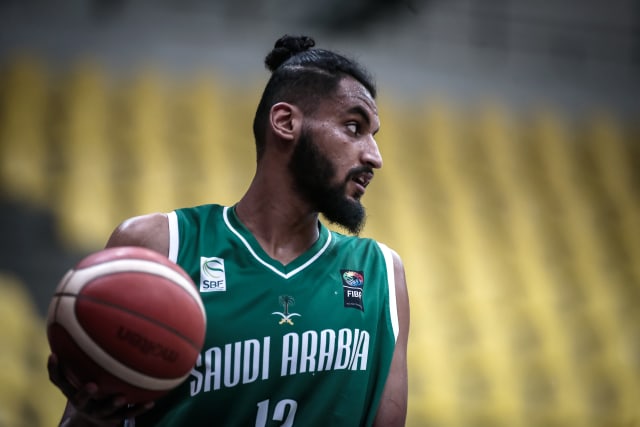Mohammed Alsuwailem: Saudi Arabia's Royalty of Rejections
JEDDAH (Saudi Arabia) - Saudi Arabia will be returning to the FIBA Asia Cup for the first time since 2013 and Qualifiers top shot-blocker Mohammed Alsuwailem is a big reason why.
JEDDAH (Saudi Arabia) - India's Sahaij Pratap Singh Sekhon thought he had an easy basket coming. He had just broken free of his defender and was wide open under the basket before receiving a pass from Vishesh Bhriguvanshi.
Khalid Abdel Gabar was closing in from behind, but Sekhon was expecting that. He had trained for moments like these.
One pump fake and Abdel Gabar was sent flying by. Now it was a simple gather, rise, and release.
Except it wasn't that simple.
A humungous green shadow gently moved its way towards Sekhon. The movement wasn't exceptionally quick, gliding along in giant strides rather than bursts of speed. As Sekhon reached the apex of his leap, the green shadow reached its outstretched arms to turn what seemed to be a one hundred percent scoring opportunity for India to zero.
Smack. Rejected.
Sekhon is a young kid. He'll eventually learn that it's never easy to score in the paint, the land where Saudi Arabia's "Royalty of Rejections", Mohammed Alsuwailem reigns.
"We are determined to achieve as much as that [Asia Cup 1999] generation has achieved and more, God willing."
Alsuwailem lists that rejection "in our game against India in the third quarter" as his favorite so far, but it definitely wasn’t easy for him to choose.
Over eight games played through the Asia Cup Qualifiers (including the Qualifying Tournament for third ranked teams), Alsuwailem swatted away a total of 23 blocks. That easily tops all players in the Qualifiers and his average of 2.9 blocks per game also marks the highest in the rankings.

To put in perspective how big of a total that is, only one other player (Ater Majok) made more than just ten blocks throughout the entire campaign. Left hand, right hand, in the post, chasing down a driving perimeter player, Alsuwailem has blocked shots in all sorts of circumstances during these qualifiers.
That's why he also holds the highest tally for blocks in a single game, tied with two other players. What makes it more special is that he reached that high total of 5 blocks twice.

"This is with the success from Allah and the help of my teammates," said the soft-spoken center. "Good timing with the opposing player and anticipating when the player is going to shoot."
The past few years have been a revelation for Alsuwailem. The 23-year-old made his debut in 2018 and started raising eyebrows with healthy averages of 11.8 points and 7.0 rebounds per game at the Western Region Pre-Qualifiers.
From there, he's only continued to get better with experience from each game of the Asia Cup Qualifiers. As the dust has settled, Alsuwailem has emerged with some outstanding numbers of 11.6 points, 10.4 rebounds, and 2.9 blocks per game while shooting 52.2 percent from the field.
The most important number of all for Alsuwailem, however, might be something else - his amount of minutes played.
The 2.08M (6'10") center played over 30 minutes in a 5 games through the Qualifiers, averaging 31.1 minutes per contest. While this might not seem like a big issue for a player with an important role like Alsuwailem, it means a whole lot more considering what he's been through and what he's had to overcome.

"One of the coaches during my career told me 'it is difficult for you to become a basketball player because you are overweight and your fitness is weak'," Alsuwailem said. "And that's what made me more insistent on putting pressure on myself in exercising."
By putting in more effort both quantitively and in quality as well as reaching out to other successful players preceding him, Alsuwailem has transformed to become one of the most promising big men in the region.
With the help of Alsuwailem's presence in the paint, Saudi Arabia has now been able to return to the FIBA Asia Cup for the first time since 2013.
"The feeling is indescribable," he said of how he felt about Saudi Arabia qualifying for the Asia Cup which will be played in July 2022.
Alsuwailem and company will have the chance to repeat and even possibly exceed what their predecessors accomplished back at Asia Cup 1999 - winning third place and inspiring the next generation.
"Most players of that generation were good players, and we have the national team manager, Yasar Mukhtar, from that generation. The extent of the impact is big."
"We are determined to achieve as much as that generation has achieved and more, God willing."
Their chance to go far beyond what any other team in the history of Saudi Arabia basketball had done will actually begin this November. That's when the 16 teams of Asia Cup 2021, including Saudi Arabia, will begin to embark on their journey through first window of the FIBA World Cup 2023 Asian Qualifiers.
Alsuwailem's shot-blocking abilities will be put up to the test once again, now going up against the likes of Jordan, Lebanon, and Indonesia in Group C.
It might seem like a daunting task for Saudi Arabia and Alsuwailem, but we've seen how bad of an idea it can be to doubt the big man's potential.
You can be sure that he's just waiting to swat all of that negativity away, just like any weak layups he sees in the paint from his opposition.
Smack.
FIBA
